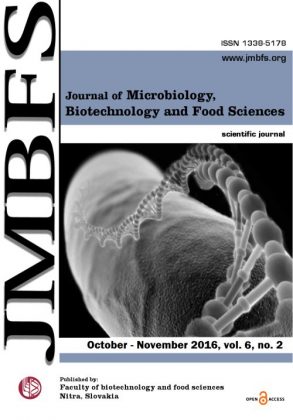PHENOLIC COMPOUDNS IN TRADITIONAL BULGARIAN MEDICAL PLANTS
DOI:
https://doi.org/10.15414/jmbfs.2016.6.2.858-862Keywords:
chicory(Cichoriumintybus L.), white birch (Betula pendula), Cotinuscoggygria, Geranium sanguineumL. and rose hip fruits (Rosa caninaL.), total phenolics, total flavonoids, rutin and tanninsAbstract
A number of plants and plant products have medicinal properties that have been validated by recent scientific developments throughout the world, owing to their potent pharmacological activity, low toxicity and economic viability. In recent years, the use of natural antioxidants present in traditional medicinal plants has become of special interest in the scientific world due to their presumed safety and nutritional and therapeutic value. In this present study, comparative phenolic compounds in traditional Bulgarian medical plants. The medical plants were analyzed for their tannins content by titrimetric method; rutin was determined spectrophotometrically by using ammonium molybdate; the total phenolics content was determined by using Folin-Ciocalteu assay and the total flavonoids were used the colorimetric reaction with aluminum (III) chloride. The present paper shown by the results of total phenolic and total flavonoid contents, and rutin and tannins in medical plants that they must be relatively safe for the patient.Downloads
Download data is not yet available.
Downloads
Published
2016-10-03
How to Cite
M. Atanassov, L., Ali Shariati, M., S. Atanassova, M., Usman Khan, M., Majeed, M., & Rashidzadeh, S. (2016). PHENOLIC COMPOUDNS IN TRADITIONAL BULGARIAN MEDICAL PLANTS. Journal of Microbiology, Biotechnology and Food Sciences, 6(2), 858–862. https://doi.org/10.15414/jmbfs.2016.6.2.858-862
Issue
Section
Biotechnology
License
Copyright (c) 2016 Lyubomir M. Atanassov, Mohammad Ali Shariati, Maria S. Atanassova, Muhammad Usman Khan, Majid Majeed, Shilan Rashidzadeh

This work is licensed under a Creative Commons Attribution 4.0 International License.
All papers published in the Journal of Microbiology, Biotechnology and Food Sciences are published under a CC-BY licence (CC-BY 4.0). Published materials can be shared (copy and redistribute the material in any medium or format) and adapted (remix, transform, and build upon the material for any purpose, even commercially) with specifying the author(s).





